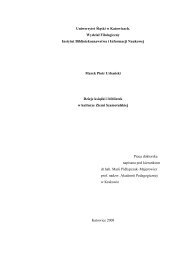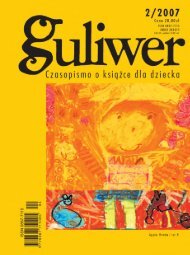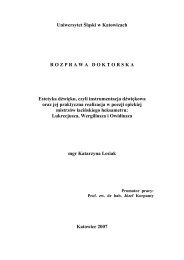- Page 2 and 3: Polish and EnglishConsonantal Clust
- Page 4 and 5: Artur KijakPolish and EnglishConson
- Page 6 and 7: ContentsPreface . . . . . . . . . .
- Page 8 and 9: PrefaceThe phonotactic peculiaritie
- Page 10 and 11: Preface92000), Ploch (1999), van de
- Page 12: List of abbreviationsBrODIdim.FODge
- Page 15 and 16: 14 The frameworkemploying the simpl
- Page 17 and 18: 16 The frameworksion in section 3 b
- Page 19 and 20: 18 The frameworkmodel is able to ha
- Page 21 and 22: 20 The frameworkhanan 1986). Thus,
- Page 23 and 24: 22 The frameworkare not derived at
- Page 25 and 26: 24 The frameworkWhat is interesting
- Page 27 and 28: 26 The frameworklateral relations,
- Page 29 and 30: 28 The frameworkIn general, we can
- Page 31 and 32: 30 The frameworkobstruents followed
- Page 33 and 34: 32 The frameworkLet us look more de
- Page 35 and 36: 34 The framework(7) PGO N O N O N O
- Page 37 and 38: 36 The frameworkby all sounds. Thus
- Page 39 and 40: 38 The frameworkexist. What is a Br
- Page 41: 40The frameworkLowenstamm’s (1999
- Page 45 and 46: 44 The phonological nature of the b
- Page 47 and 48: 46 The phonological nature of the b
- Page 49 and 50: 48 The phonological nature of the b
- Page 51 and 52: 50 The phonological nature of the b
- Page 53 and 54: 52 The phonological nature of the b
- Page 55 and 56: 54 The phonological nature of the b
- Page 57 and 58: 56 The phonological nature of the b
- Page 59 and 60: 58 The phonological nature of the b
- Page 61 and 62: 60 The phonological nature of the b
- Page 63 and 64: 62 The phonological nature of the b
- Page 65 and 66: 64 The phonological nature of the b
- Page 67 and 68: 66 The phonological nature of the b
- Page 69 and 70: 68 The phonological nature of the b
- Page 71 and 72: 70 The phonological nature of the b
- Page 73 and 74: 72 The phonological nature of the b
- Page 75 and 76: 74 The phonological nature of the b
- Page 77 and 78: 76 The phonological nature of the b
- Page 79 and 80: 78 The phonological nature of the b
- Page 81 and 82: 80 The phonological nature of the b
- Page 83 and 84: 82 The phonological nature of the b
- Page 85 and 86: 84 The phonological nature of the b
- Page 87 and 88: 86 The phonological nature of the b
- Page 89 and 90: 88 The phonological nature of the b
- Page 91 and 92: 90 The phonological nature of the b
- Page 93 and 94:
92 The phonological nature of the b
- Page 95 and 96:
94 The phonological nature of the b
- Page 97 and 98:
96 The phonological nature of the b
- Page 99 and 100:
98 The phonological nature of the b
- Page 101 and 102:
III. Bogus clusters, syllabic conso
- Page 103 and 104:
102 Bogus clusters, syllabic conson
- Page 105 and 106:
104 Bogus clusters, syllabic conson
- Page 107 and 108:
106 Bogus clusters, syllabic conson
- Page 109 and 110:
108 Bogus clusters, syllabic conson
- Page 111 and 112:
110 Bogus clusters, syllabic conson
- Page 113 and 114:
112 Bogus clusters, syllabic conson
- Page 115 and 116:
114 Bogus clusters, syllabic conson
- Page 117 and 118:
116 Bogus clusters, syllabic conson
- Page 119 and 120:
118 Bogus clusters, syllabic conson
- Page 121 and 122:
120 Bogus clusters, syllabic conson
- Page 123 and 124:
122 Bogus clusters, syllabic conson
- Page 125 and 126:
124 Bogus clusters, syllabic conson
- Page 127 and 128:
126 Bogus clusters, syllabic conson
- Page 129 and 130:
128 Bogus clusters, syllabic conson
- Page 131 and 132:
130 Bogus clusters, syllabic conson
- Page 133 and 134:
132 Bogus clusters, syllabic conson
- Page 135 and 136:
134 Bogus clusters, syllabic conson
- Page 137 and 138:
136 Bogus clusters, syllabic conson
- Page 139 and 140:
138 Bogus clusters, syllabic conson
- Page 141 and 142:
140 Bogus clusters, syllabic conson
- Page 143 and 144:
142 Bogus clusters, syllabic conson
- Page 145 and 146:
144 Bogus clusters, syllabic conson
- Page 147 and 148:
146 Bogus clusters, syllabic conson
- Page 149 and 150:
148 Bogus clusters, syllabic conson
- Page 151 and 152:
150 Bogus clusters, syllabic conson
- Page 153 and 154:
152 Conclusionnisms available in th
- Page 155 and 156:
154 ReferencesBotma, B. (2004) Phon
- Page 157 and 158:
156 ReferencesGussmann, E. (1998) D
- Page 159 and 160:
158 ReferencesPawelec, P. (1989) Cy
- Page 161 and 162:
160 ReferencesScheer, T. (1997) Vow
- Page 164 and 165:
Author indexAbercrombie, David 103A
- Page 166 and 167:
Artur KijakGrupy spó³g³oskowe w
- Page 168 and 169:
Zusammenfassung167für alle anderen
















